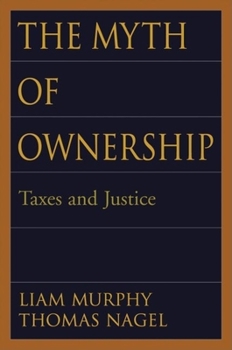The Myth of Ownership: Taxes and Justice
Select Format
Select Condition 
Book Overview
In a capitalist economy, taxes are the most important instrument by which the political system puts into practice a conception of economic and distributive justice. Taxes arouse strong passions, fueled not only by conflicts of economic self-interest, but by conflicting ideas of fairness. Taking as a guiding principle the conventional nature of private property, Murphy and Nagel show how taxes can only be evaluated as part of the overall system of...
Format:Hardcover
Language:English
ISBN:0195150163
ISBN13:9780195150162
Release Date:April 2002
Publisher:Oxford University Press, USA
Length:240 Pages
Weight:0.95 lbs.
Dimensions:0.8" x 8.4" x 5.7"
Customer Reviews
2 ratings
I disagree with the argument, but the book is fairly solid
Published by Thriftbooks.com User , 18 years ago
Nagel and Murphy have missed an important point in not recognizing that although property rights are conventional, Nozick gives a very convinving ontology of property rights that is compatible with the Lockean tradition. In other words, though property rights as they exist are conventional, they arise from the state of nature in a manner such that government enforcement is not an inherent quality of them. Hence, in arguing that individuals do not wholly own the fruits of their labor due to the fact that the possession of such fruits is enabled by government enforcement of property rights, Nagel and Murphy are clearly missing why Nozick comes to hold the entitlement view of property. With all of this said, this is a pretty good book overall. It is one thing to disagree with the authors and their argument, it's another to outrightly discredit each of them as individuals. Previous reviewers that oversimplify what Murphy and Nagel are doing here seemingly either do not understand the complexities of these issues, or do not have the intellectual honesty and/or curiosity to consider something that is prima facie opposed to their opinion. To question the academic credibility of the authors is simply ignorant, as both are highly reputable and regarded, and to assert that the authors "seem unaware of the Lockean tradition" is dubious, since Locke is clearly mentioned and farily represented in the book.
Is Vertical Equity Really Dead?
Published by Thriftbooks.com User , 22 years ago
The main thrust of Murphy & Nagel's claim is that pre-tax income cannot be a moral base for the measurement of the fairness of taxation. Their claim is that the ultimate social justice of the entire economic system is the only proper end, of which taxation is a part, thus taxation and the equity thereof cannot be measured in a vaccum, rather only against the resulting end.It would seem however that Murphy & Nagel make their claim too strong in that they claim that pre-tax income (and vertical equity) cannot be utilized as even a factor in the measurement. Unfortunately for their theory, pre-tax income is a fact of the market economy and the positive law surrounding such economy. Thus, if we are to ignore everyone's pre-tax income, the only possible result is that all after-tax income must come out equal. To claim any other result must come through the application of a judgment as to vertical equity.It would seem that their claim would be far more sound if it were limited to saying that vertical equity may only be utilized as a means to achievement of the end of social justice. Murphy & Nagel, however, want to make their claim stronger so as to be able to discount the tax equity argument entirely. Ultimately such an argument must fail due to the reality of pre-tax income, but it is still a very interesting and well written book.






